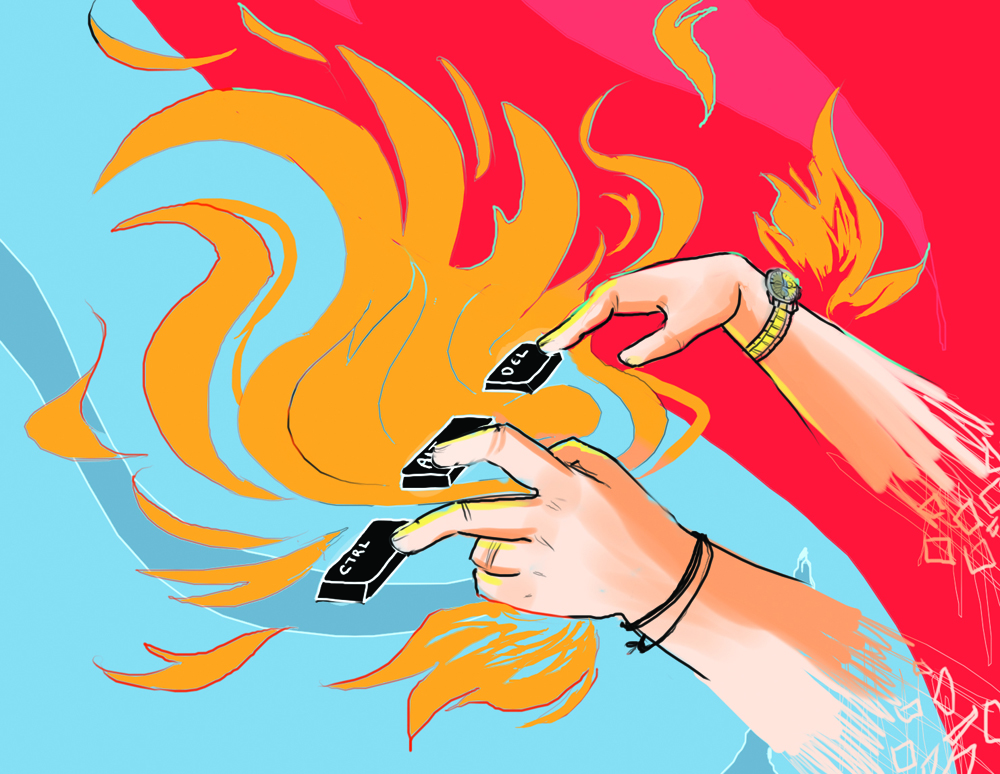Jonny Chard | News Editor
Featured illustration courtesy of Jasmine Wiradharma
Clowns to the left of me, jokers to the right. Here we are, stuck in the middle of it all.
Western liberal democracies are under siege from a surge of monocracy on both the right and left side of the political spectrum.
With a frustration with the status quo, an inability to catch up with the evolving economy and greater levels of multiculturalism, many have turned to grassroots politics to offer comfort in unfamiliar surroundings.
The growth of the alt-right is well documented on online forums, with individuals like Nigel Farage, Milos Yiannopoulos and Jordan Peterson serving as figureheads for a right-wing rejection of the current sociopolitical climate.
On Facebook, Twitter and online blogs, the term “snowflake” is perpetually thrown around to brand anybody and anything that is viewed as conforming to political correctness.
It is the commonly held belief on the right that the current generation, which tends to be left-leaning, is one that is soft and offended by every opinion that goes against their narrative.
They fail to realize, however, the hypocrisy in that they embody the very same ideologically arrogant problem.
The wish to uphold free speech and democracy only as long as it furthers their agenda means that there is a need for a safe space to air their views without the rejection of mainstream society.
In both the United Kingdom and the United States, there is an inherent sense of fragility and insecurity that has seen a push for the losers to suck it up, accept it and press ahead with a political movement they don’t believe in.
When has that ever happened?
While not all of those who associate with the right wing, or the alt-right, subscribe to ethnic nationalism, homophobia and Islamophobia, for example, it is of vital importance to rationally challenge the most dangerous of the alt-right’s beliefs.
Instead of dousing the flames, the ctrl-left has unintentionally fanned the nationalist fire further and it is now at risk of burning the house down.
They condemn conservative politics and the inclination to discriminate against ethnic and sexual minorities, but when it comes down to debating the alt-right, there is a lack of conviction to intellectually challenge and, instead, choose to dismiss them completely.
In calling for no platforming and censorship of unpleasant views, the alt-right are empowered further. The moment you silence a view, you give more credence for its believers to pursue it.
The political climate has bred a wider culture that discourages debate and compromise, in favour of one that incentivises a denial of polar views and a retreat from intellectual probing.
As an academic institution, York should hold constructive debate and academic scrutiny as its foundation, but unfortunately, it too is engulfed by the inferno of division.
Groups at York preoccupy themselves with incessant posturing, which propagates a toxic environment for the students who simply want to get on with their degrees.
Even before joining York in September, I was aware of its synonymy with protesting, striking and controversy—and I am from 3,000 miles across the Atlantic Ocean.
The atmosphere isn’t one that attracts people to York and for many, it doesn’t foster a pride in the institution once a part of it.
The polarization of the West has seen a spike in hate crime and only in the past month, York has seen police attend to numerous instances of hate graffiti and threats against various sectors of the community.
More than ever, it is important to carve out a centred, reasoned and rational space for coexistence.
We are all students wanting to gain degrees, get good jobs and forge our path in the world. The fear of engagement and love of antipathy and inanity isn’t helping anyone.
If two opposing sides to any issue fail to recognize and seek to understand the perspective of the other, there is no room for progress and inflammatory campus issues will continue.
The fire needs to be extinguished.
Ctrl-left, alt-right, delete.


